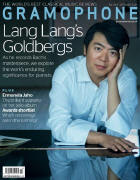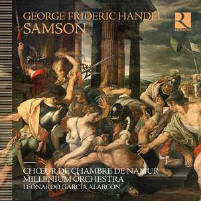Texte paru dans: / Appeared in: |
|
|
Outil de traduction (Très approximatif) |
|
|
Reviewer:
David Vickers The Dunedin Consort recently demonstrated that the unabridged first performance version of Samson (1743) is a complex masterpiece of musical and literary ideas that are conveyed less adroitly in the other uncut recording by The Sixteen. On the other hand, some performers fear that Handel’s longest dramatic oratorio is biting off more than they can chew unless it is heavily cut, or they are forced to make damaging compromises when concerts are planned to finish an hour or so sooner than the oratorio lasts. Nicholas McGegan followed Handel’s shortened version from the early 1750s – a sensible option which is still not that short. Leonardo García Alarcón opts ‘for the same choices as those made by Nikolaus Harnoncourt, believing them to be the best’. The botched text used for Harnoncourt’s flawed interpretation omits more than a quarter of the work (Alarcón’s running time is almost an hour less than John Butt’s), which cannot possibly bring to life every facet of Handel’s epic Miltonic oratorio. Nevertheless, this live recording captures a panoply of moods and colours abetted by theatrical vitality and predominantly brisk pacing. The horns pack a punch in the overture, the chorus ‘Awake the trumpet’s lofty sound’ vigorously depicts the Philistines’ festival worshipping Dagon, during which ‘Ye men of Gaza’ is sung delectably by Julie Roset; she also sings the Israelite Woman’s ‘Let the bright seraphim’ with sparkling blitheness. Matthew Newlin’s Samson over-milks silences and bellows climactic phrases in ‘Total eclipse’, and forcefulness in ‘Thus when the sun from its wat’ry bed’ misses the point. On the plus side, Newlin enacts the prisoner’s conflicted feelings of bitter melancholy and acerbic frustration during Dalila’s visit, and reawakened conceitedness in his parleying with Harapha. Lawrence Zazzo applies operatic extroversion to Micah’s contemplative ‘Then long eternity’ (reduced to its first few bars) and ‘Return, O God of hosts’ (taken too fast). Klara Ek’s smouldering Dalila is aptly petulant in ‘To fleeting pleasures make your court’ – although the flanking chorus for her retinue sags under laboured shaping and a dragging tempo. Luigi Di Donato doubles up as Samson’s anxious father Manoah and bullying antagonist Harapha: woolly vibrato, lopsided phrasing and poor English enunciation cause Manoah’s airs to bulge inelegantly; Harapha’s taunting ‘Honour and arms’ comes across rather better. Overly florid extemporising in recitatives by the theorbist and cellist might be overcompensation for the total lack of a harpsichord. Its absence also causes counterproductive smothering from anachronistic chamber organ in airs and recitatives. However, the Millenium Orchestra’s broad textural palette is matched by the Namur Chamber Choir’s firmness of commitment and expressive flexibility: the Israelites’ petition in ‘Hear, Jacob’s God’ (its archaic suspensions borrowed from Carissimi) is slower than usual and has an affecting emotional gravitas, and the choir quickly transform into gloating Philistines worshipping Dagon with paganistic horns and chuckling oboes (‘To song and dance we give the day’). Alarcón’s conception and whimsies are often questionable (the Dead March is accelerated to an almost breezy canter), but some memorable moments offer valuable insights. |
|




